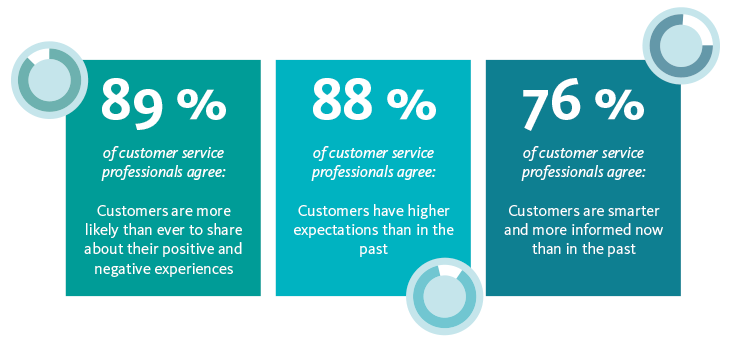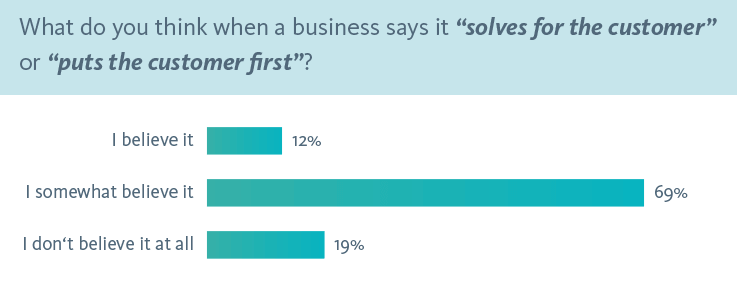Key points
- Lately, keeping the customers above all is the most common belief for most enterprises, but merely in theory.
- When we talk about great customer experiences, customers' beliefs about the services businesses offer are of the utmost importance.
- AI-based service desks shed light on the entire customer journey, which helps businesses delight customers.
What defines good customer service? Today, at least in theory, every company knows that "customer first" is the most important credo in customer service. Companies should offer the best possible customer experience and a seamless customer journey.
So much about the theory. But how do you realize a service tailored to the customer’s needs? If you are serious about answering this question and overcoming the challenges on the path to the solution, there is just one way. You need to start thinking from your customer’s perspective consistently. Find out as much as you can about your customers.
What makes your customers stick?
What do your customers think about your service? What are their specific requirements from your company? Where do they get stuck in the digital dead end? Where could you do better? If you are going to deliver truly excellent service, you have got to know who you are dealing with.
According to a study by HubSpot, surveying 1025 customer service experts in the US, Great Britain, Canada, and Australia, three customer attributes are particularly critical nowadays:

1. Customers are more communicative
89% of the surveyed customer service experts believe that customers communicate their positive and negative experiences more than ever. As a consequence, digitalization has not only given individuals more ways to communicate than ever, but they are also heard much quicker on social media.
2. Customers have ever-growing expectations
88% of the surveyed customer service experts believe their customers have much higher expectations now than in the past. For example, customers expect quicker turnaround, better responses, and personalized feedback.
3. Customers are much better informed
76% of the surveyed customer service experts say that customers know more and are more informed than ever. Hence, they have much more control over processes related to their matters.
Impossible without AI technology
These survey outcomes confirm the importance of the "customer first" principle in creating great customer experiences. Personal and individualized customer service is essential. Customers want to be treated as humans. Like so many organizations, you are not living up to that promise if you rely on chatbots. In times of real-time responses, on the other hand, one thing is evident: this is impossible without the support of intelligent technology.
Also read: How To Design Workflows That Delight Agents And Customers Alike
Big data, big picture "Customer first"—sadly, only in theory
So, how does this work in real life? How do companies respond to the "customer first" premise? According to HubSpot’s insights, unfortunately, they do so quite tentatively. Companies’ messages are very clear: "Customer first." However, only about half of the participating companies jump into action. One indicator of a lack of readiness to truly get to know one’s customers is that only 58% of the companies surveyed by HubSpot analyze their customer data.

Customers do surely notice the difference: According to HubSpot, only 12% believe their issue is handled with priority or according to their individual needs. In times of "customer first," that is quite a poor result. Particularly considering that learning more about your customers’ wishes, needs, and disappointments has never been easier.
Also read: ThinkOwl CX Playbook – Your Ultimate Guide To Customer Success
Getting smart with AI tools
Today, virtually any service-desk software comes with integrated intelligent analytics and reporting tools that enable you to shed light on the entire customer life cycle. Integrated in an application, they are typically very easy to operate and user-friendly. Here are a few examples of how these tools can help you to get to know your customers:
Intelligent analytics and reporting tools
- generate relevant customer statistics
- assess customers’ communication behavior
- draw relevant conclusions about how happy your customers are
- indicate how and on what channels customers communicate with companies
- inform your customers in real time when their moods change
So, there is no reason why "customer first" should remain merely a theory. The first step to implementation is easier than you may think. Say goodbye to overwhelming workloads and hello to smoother operations with ThinkOwl, the AI-powered service desk software. Streamline tasks, track issues efficiently, and boost productivity for a happier, more successful support center. Sign up for a 30-day free trial now.













